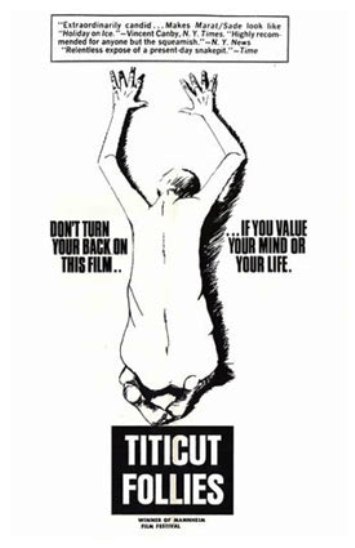- Titicut Follies
Infobox_Film
name = Titicut Follies

caption = Theatrical poster
director =Frederick Wiseman
producer = Frederick Wiseman
writer =
starring =
music =
cinematography = John Marshall
editing = Alyne Model Frederick Wiseman
distributor = Zipporah Films, Inc.
released =October 3 1967
runtime = 84 minutes
language = English
budget =
website = http://www.zipporah.com/
amg_id = 1:139934
imdb_id = 0062374|"Titicut Follies" is a black and white 1967
documentary film byFrederick Wiseman about the treatment of inmate / patients atBridgewater State Hospital for the criminally insane, a Massachusetts Correctional Institution inBridgewater, Massachusetts . The title is taken from atalent show put on by the hospital's inmates. (The talent show was taken from theWampanoag name for the nearbyTaunton River in their native language).Background
"Titicut Follies" portrays the existence of occupants of Bridgewater, some of them
catatonic , holed up in unlit cells, only periodically washed down with a hose and taken out in order to receiveforce feeding . It also portrays the indifference andbullying on the part of the institution's staff.Just before the film was due to be shown at the 1967
New York Film Festival , the government of Massachusetts tried to get an injunction banning its release.cite news|first=Jesse|last|Pearson|title=The Follies of Documentary Filmmaking|url=http://www.viceland.com/int/v14n9/htdocs/doc.php?country=us|work=Vice|accessdate=2008-04-21] The government claimed that the film violated the patients'privacy and dignity.cite news |first=David |last=Mills |authorlink= |coauthors= |title=Mass. Court Lifts Ban On 24-Year-Old Film; Privacy Right Overruled for Wiseman's `Titicut' |url=http://www.highbeam.com/doc/1P2-1077949.html |work=Washington Post |publisher= |date=1991-08-02 |accessdate=2008-04-21 ] Although Wiseman received permission from all the people portrayed or the hospital superintendent (theirlegal guardian ), Massachusetts claimed that this permission could not take the place of valid release forms from the inmates.cite court |litigants=WISEMAN v. MASSACHUSETTS |vol=398 |reporter=U.S. |opinion=960 |pinpoint= |court= |date=1970 |url=http://caselaw.lp.findlaw.com/scripts/getcase.pl?navby=CASE&court=US&vol=398&page=960] It also claimed that Wiseman breached an "oral contract" giving the state government editorial control over the film. However, a New York state court allowed the film to be shown. In1968 , however, Massachusetts Superior Court judge Harry Kalus ordered the film yanked from distribution and called for all copies to be destroyed, citing the state's concerns about violations of the patients' privacy and dignity.Wiseman appealed to the
Massachusetts Supreme Judicial Court , which in 1969 allowed it to be shown only to doctors, lawyers, judges, health-care professionals, social workers, and students in these and related fields. Wiseman appealed to theUnited States Supreme Court , which refused to hear the case.Wiseman has pointed out that he received permission from all of the people portrayed in the film or else their
legal guardian , in this case the superintendent of Bridgewater. He believes that the government of Massachusetts, feeling concerned that it portrayed a state institution in a bad light, intervened to protect its own reputation. The state intervened after a social worker inMinnesota wrote to GovernorJohn Volpe expressing shock at a scene involving a naked man being taunted by a guard.The dispute marked the first known instance in the history of the American film industry that a film was banned from general distribution for reasons other than obscenity, immorality or national security.Fact|date=October 2008 It was also the first time that Massachusetts recognized a
right to privacy at the state level.Fact|date=October 2008In 1991, Superior Court Judge Andrew Meyer allowed the film to be released to the general public, saying that as time had passed, privacy concerns had become less important than
First Amendment concerns. He also said that many of the former patients had died, so there was little risk of a violation of their dignity. The state Supreme Court has ordered that "A brief explanation shall be included in the film that changes and improvements have taken place at Massachusetts Correctional Institution Bridgewater since 1966." [cite video | people =Fredrick Wiseman (director)| title =Titicut Follies| medium =| publisher =Zipporah Films, Inc.| location =| date = 1992] The film was shown onPBS in1992 The film is now legally available through the distributor, Zipporah Films, Inc., for purchase or rental onVHS ,DVD and16mm film for both educational and individual license. Zipporah Films released the DVD of the film to the home market in December 2007.Awards
* Mannheim-Heidelberg International Filmfestival: Mannheim Film Ducat, Frederick Wiseman; 1967.
References
Bibliography
* Carolyn Anderson and Thomas W. Bensson. "Documentary Dilemmas: Frederick Wiseman's Titicut Follies" (Southern Illinois University Press, 1991, ISBN 0-8093-1518-1)
* Barry Keith Grant and Frederick Wiseman. "Five Films by Frederick Wiseman – Titicut Follies, High School, Welfare, High School II, Public Housing" (University of California Press, 2006, ISBN 0-520-24456-7)Notes
External links
*
*
* [http://fee.org/publications/the-freeman/article.asp?aid=8077 "Therapeutic Censorship"] . An essay byantipsychiatry advocateThomas Szasz
* [http://reason.com/news/show/123022.html Frederick Wiseman] interview by "Reason" magazine
* [http://www.zipporah.com "Titicut Follies"] at Zipporah Films, Inc., the film's distributor
Wikimedia Foundation. 2010.
